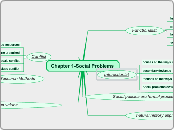Chapter 1-Social Problems
Functionalist
knowledge and behaviors that involve treatment of the patient's immediate needs and administration of care according to the doctor's orders
patient, in turn, is expected to cooperate in the administration of the treatment
how major social institutions actually operate
societies are always changing; failure to adapt successfully to change leads to social problems.
Conflict
ocial problems arise out of major contradictions in the way societies are organized; contradictions that lead to struggle over scarce resources.
belief that social problems arise out of major contradictions in the way societies are organized
unequal distribution of resources, which lead to large-scale conflict
marx-class conflict
Interactionist
ocuses on the ways in which people actually take on the values of the group of which they are members, exploring how different groups define situations.
secondary deviance
a person labeled a drug addict may adopt elements of what is popularly viewed as a drug addict's lifestyle: resisting employment or treatment, engaging in crime, and so on.
focuses on the ways in which people actually take on the values of the group in which they are members
Social problems evolve, in part, because influential people may “construct” them and convince others that they exist
Research Methods
ethnographic studies, demographic studies, survey research, field observation, and social experiments
Social policies are formal procedures designed to remedy a social problem
natural history approach
analysis of social problems focuses on public perception of conditions that come to be defined as problems
four stages in the development of a social problem
roblem definition, legitimacy, reemergence of demands, and rejection and institution building.
people in a society agree that a condition exists that threatens the quality of their lives and their most cherished values
agree something needs to be done to remedy the problem
